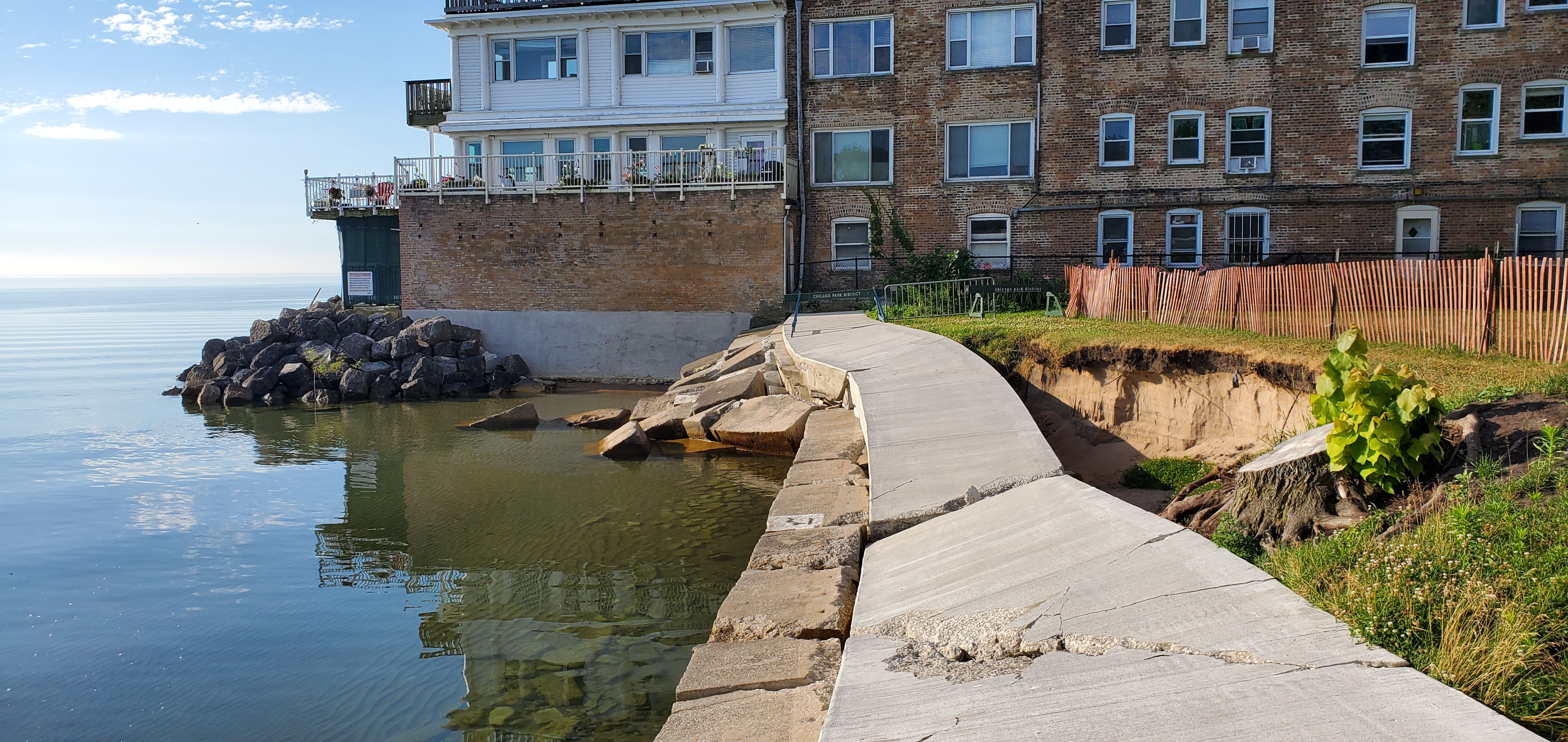For ten years, I lived on Eastlake Terrace, the northeasternmost street in Chicago. Eastlake is only three blocks long, but it runs past three beaches: Howard, Rogers and Juneway. On summer mornings, before the lifeguards showed up, I would walk out my front door to Juneway Beach and start my day with a 15-minute swim in Lake Michigan. One of my neighbors, a lifelong resident of the street, told me that when he was a boy, he and his friends would compete to see who dared jump into the lake at the earliest date. Usually, it was sometime in April.
Now, though, those beaches are disappearing beneath Lake Michigan. Rogers Avenue Beach is still open for swimming, but the lake has completely covered the sand, leaving only a pile of stones at the water's edge; a chain link fence sequesters the crumbling pier.
And Juneway Beach, which the Park District acquired in 1959, isn't even a beach anymore. The water laps up against a concrete breakwall that was installed last year by the Army Corps of Engineers, but it's already caving in.
Here's what Juneway Beach used to look like, for reference:

According to the Army Corps, Lake Michigan is at its highest level since 1986, the year it set an all-time record. The mean water level in June was 581.76 feet, the highest ever recorded for that month, and four feet above normal, or what used to be normal.
In May, the National Oceanic and Atmospheric Administration warned that "[s]everal Great Lakes are expected to reach record high water levels in the next six months, thanks to above average precipitation in the watershed and large amounts of runoff this year," and that as a result, "residents should prepare for an increased risk of erosion and minor flooding during storm events."
Sure enough, Eastlake Terrace's beaches are eroding. The culprit, as with so many meteorological and hydrological extremes, is climate change. As the atmosphere warms, the lake's lows are getting lower, and its highs are getting higher.
According to Scientific American, surface water temperatures rose by about 2 degrees Celsius on lakes Superior, Huron, and Michigan in the late '90s. As a result, because warmer water evaporates more quickly, those lakes hit their lowest levels ever recorded by 2013.
Then came 2014's Polar Vortex, itself a consequence of global warming. The lakes froze, reducing evaporation. From Scientific American:
At roughly the same time, precipitation was increasing. The 2017 Lake Ontario flood followed a spring of extreme overland precipitation in the Lake Ontario and Saint Lawrence River basins. The 2019 flood follows the wettest U.S. winter in history
[snip]
Great Lakes water levels have varied in the past, so how do we know whether climate change is a factor in the changes taking place now?
Precipitation increases in winter and spring are consistent with the fact that a warming atmosphere can transport more water vapor. Converting water from vapor to liquid and ice releases energy. As a result, increased atmospheric moisture contributes to more precipitation during extreme events. That is, when weather patterns are wet, they are very wet. Changes in seasonal cycles of snowmelt and runoff align with the fact that spring is coming earlier in a changing climate. Climate models project that this trend will continue. Similarly, rising lake temperatures contribute to increased evaporation. When weather patterns are dry, this produces lower lake levels.
Maria Hadden, the 49th Ward's new alderman, told CBS2 she's working with the Army Corps and Chicago Park District to shore up Rogers Park's beaches, but has been denied federal funds for a shoreline study. (Park District officials did not respond to questions about Juneway Beach.)
Considering how quickly Lake Michigan chewed up the Army Corps's last attempt to hold it back, there may not be a man-made solution to this problem. When I lived on Eastlake Terrace, I thought it was the best street in Chicago: the only north-south thoroughfare with unmediated access to the lake.
Now, Eastlake Terrace is on the front line as climate change encroaches on our lakefront. We can't win that battle — we can only retreat. I'm half a mile inland now. I may have moved just in time.




Comments are closed.